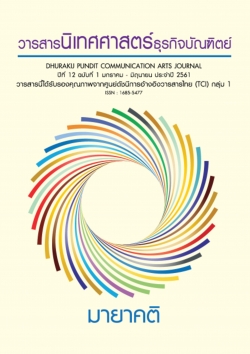การพัฒนานวัตกรรมเชิงเนื้อหาด้วยกลยุทธ์การเล่าเรื่องข้ามสื่อสำหรับรายการโทรทัศน์
คำสำคัญ:
รายการโทรทัศน์, ทีวีดิจิทัล, การผลิตสื่อข้ามสื่อ, สื่อดิจิทัล, สื่อคอนเวอร์เจ้นท์, นวัตกรรมบทคัดย่อ
บทความวิชาการเรื่องนี้ศึกษามิติของการขยายต่อเนื้อหาแบบข้ามสื่อในธุรกิจรายการโทรทัศน์ เพื่อทำให้รายการโทรทัศน์มีคนดู และหารายได้ด้วยการใช้ประโยชน์จากจุดแข็งของการมีสื่อหลายแพลตฟอร์มโดยผนวกข้อดีของสื่อเก่าและสื่อใหม่เข้าด้วยเพื่อสร้างนวัตกรรมเชิงเนื้อหาให้กับสถานีโทรทัศน์ หรือที่เรียกว่า กลยุทธ์ผลิตเนื้อหาและการเล่าเรื่องแบบข้ามสื่อ การพัฒนานวัตกรรมเชิงเนื้อหาคือการหารูปแบบวิธีในการเล่าเรื่อง และลดช่องว่างของสื่อเก่ากับพฤติกรรมของผู้รับสารที่เปลี่ยนแปลงไปในทิศทางการเลือกตามความสนใจ บทความวิชาการนี้ถอดบทเรียนกรณีศึกษาจากช่อง Channel 4 ประเทศอังกฤษ ซึ่งพัฒนากลยุทธ์การทำรายการโทรทัศน์และเนื้อหาแบบข้ามสื่อและทำให้เพิ่มจำนวนคนดูโทรทัศน์ และรายการโทรทัศน์ยังสร้างผลกระทบต่อการเปลี่ยนแปลงในสังคมได้ นอกจากนั้น มีการสนทนากลุ่มกับกลุ่มนักศึกษาที่ทดลองพัฒนานวัตกรรมเนื้อหาข้ามสื่อให้กับรายการโทรทัศน์ และสัมภาษณ์เชิงลึกกับวิชาชีพผู้ผลิตโทรทัศน์ถึงการปรับตัวของการทำงาน พบว่า การทำกลยุทธ์ข้ามสื่อที่มีประสิทธิภาพช่วยดึงคนกลับมาดูรายการโทรทัศน์ และเข้าถึงเนื้อหาส่วนขยายเพิ่มบนสื่อสังคมซึ่งทำให้เกิดปฏิสัมพันธ์ต่อเนื้อหารายการได้ และในบางกลยุทธ์สามารถเพิ่มช่องทางในการหารายได้จากการได้สปอนเซอร์สำหรับเนื้อหาเฉพาะบนสื่อสังคมด้วย ดังนั้น การพัฒนานวัตกรรมข้ามสื่อประกอบด้วยการเข้าใจผู้รับสารเชิงลึก มีกลยุทธ์ในการเผยแพร่และสร้างการมีส่วนร่วมบนทุกแพลตฟอร์ม มีการเล่าเรื่องข้ามสื่อที่เชื่อมโยงเนื้อหาทั้งหมดให้เสริมกัน และสร้างเนื้อหาจากประเด็นสำคัญที่ตรงกับความสนใจของกลุ่มเป้าหมาย
เอกสารอ้างอิง
Channel 4. (2016, July 14). We're The Superhumans | Rio Paralympics 2016 Trailer [Video File].
Video posted to https://www.youtube.com/watch?v=IocLkk3aYlk
Christie, M. (2010, November 17). Inside Incredible Athletes [Video File]. Video posted to
https://vimeo.com/16928865
2. Cunsolo, A. (2010, September 29). That Paralympic Show. Retrieved from
http://blogs.bl.uk/socialscience/2010/09/that-paralympic-show.html
3. Davies, G.A. (2010, August 9). London 2012 Paralympics: Channel 4 makes disability sport its
main event. Retrieved from http://www.telegraph.co.uk/sport/olympics/7934650/London-2012-Paralympics-Channel-4-makes-disability-sport-its-main-event.html
4. Dogruel, L (2014). What is so Special about Media Innovations? A Characterization of the Field.
The Journal of Media Innovations 1.1 (2014): 52-69
5. Ernst & Young (2011). The digitalisation of everything: How organisations must adapt to
changing consumer behaviour. London, UK สืบค้นจาก
http://www.ey.com/Publication/vwLUAssets/The_digitisation_of_everything_-_How_organisations_must_adapt_to_changing_consumer_behaviour/$FILE/EY_Digitisation_of_everything.pdf
6. Forlano, L. (2010). Mobile Social Networking and the News. In G. Einav (Ed.), Transitioned
Media: A Turning Point Into the Digital Realm. Springer Media.
7. Freedman, D. (2002). A 'Technological Idiot'? Raymond Williams and Communications Technology, Information, Communication & Society, 5:3, 425-442, DOI:
10.1080/13691180210159346
8. Gere, C. (2002). Digital culture. London: Reaktion Books.
9. Grant, K. (2012, September 25). When Helping Women Just “Clicks”. Retrieved from
http://www.halftheskymovement.org/blog/entry/when-helping-women-just-clicks
10. Hancox, D (2014). 5 Examples of Transmedia Storytelling and Activism. Retrived from
http://www.thewritingplatform.com/2014/04/5-examples-of-transmedia-storytelling-and-activism/
http://reutersinstitute.politics.ox.ac.uk/fileadmin/documents/Publications/The_rise_of_social_media_and_its_impact_on_mainstream_journalism.pdf
11. Laura Warby, associate director (business and strategy) บริษัท CrowdDNA. สัมภาษณ์, 12
กันยายน 2560
12. Mulgan, G. (2012). The Theoretical Foundations of Social Innovation. In A. Nicholls & A.
Murdock (eds.), Social Innovation: Blurring Boundaries to Reconfigure Markets (pp. 33-
65). London: Palgrave Macmillan.
13. Napoli, P. M. (2009). Media Economics and the Study of Media Industries. In J. Holt & A. Perren
(eds.), Media Industries: History, Theory, and Method (pp. 161-170). West Sussex:
Blackwell Publishing.
14. Neuberger,C. and Nuernbergk, C. (2010). Competition, Complementarity or integration? The
relationship between professional and participatory media. Journalisme Practice, 4(3),
319-332
15. Newman, N. (2009). The rise of social media and its impact on mainstream media (working
paper). Oxford: Reuters Institute for the Study of Journalism. Retrieved from
16. Nicholas and Sheryl . (2012). Half The Sky Movement. Retrieved from
http://www.halftheskymovement.org/pages/movement
17. Ofcome. (2017). Channel 4 Corporation Remit. Retrieved from
https://www.ofcom.org.uk/__data/assets/pdf_file/0018/104094/Channel-4-Corporation-Remit-Research-Report-2017.pdf
18. Reca, A. A. (2006). Issues in Media Product Management. In A. B. Albarran, S. M. Chan-
Olmsted& M. Wirth (eds.), Handbook of Media Management and Economics (pp. 181-
201). Mahwah: Lawrence Erlbaum Associates.
19. Skoler M. (2009). Why the news media became irrelevant—And how social media can help.
Nieman Reports, 63, 38–40.
20. Srisaracam.S (2016). Social media agenda setting to drive social issues for awarenes and
change. Phranakhon Rajabhat Research Journal (Humanities and Social Sciences) Vol.
12 No.1 (January-June). p 236-249
21. Storsul, T., & Krumsvik, A. H. (2013). What is Media Innovation? In S. Storsul & A. H. Krumsvik
(eds.), Media Innovation. A Multidisciplinary Study of Change (pp. 13-26). Göteborg:
Nordicom
22. Thairath Online. (2015). Advertisement decline, Print in crisis while digital media has
opportunity. How media company survive? Retrieved from
http://www.thairath.co.th/content/537853 (in Thai).
23. THE FISH FIGHTER'S TOOLKIT. (2014) Retrieved from http://www.fishfight.net/
24. Van Dijck, J. (2009). Users like you? Theorizing agency in user-generated content. Media,
Culture & Society 31(1): 41-58.
25. Varela, P. (2017, January 9). P5 digital journalism trends to follow in 2017. Retrieved from
http://www.openhost.es/news/5-digital-journalism-trends-to-follow-in-2017/
ดาวน์โหลด
เผยแพร่แล้ว
ฉบับ
ประเภทบทความ
สัญญาอนุญาต
ลิขสิทธิ์เป็นของวารสาร....




